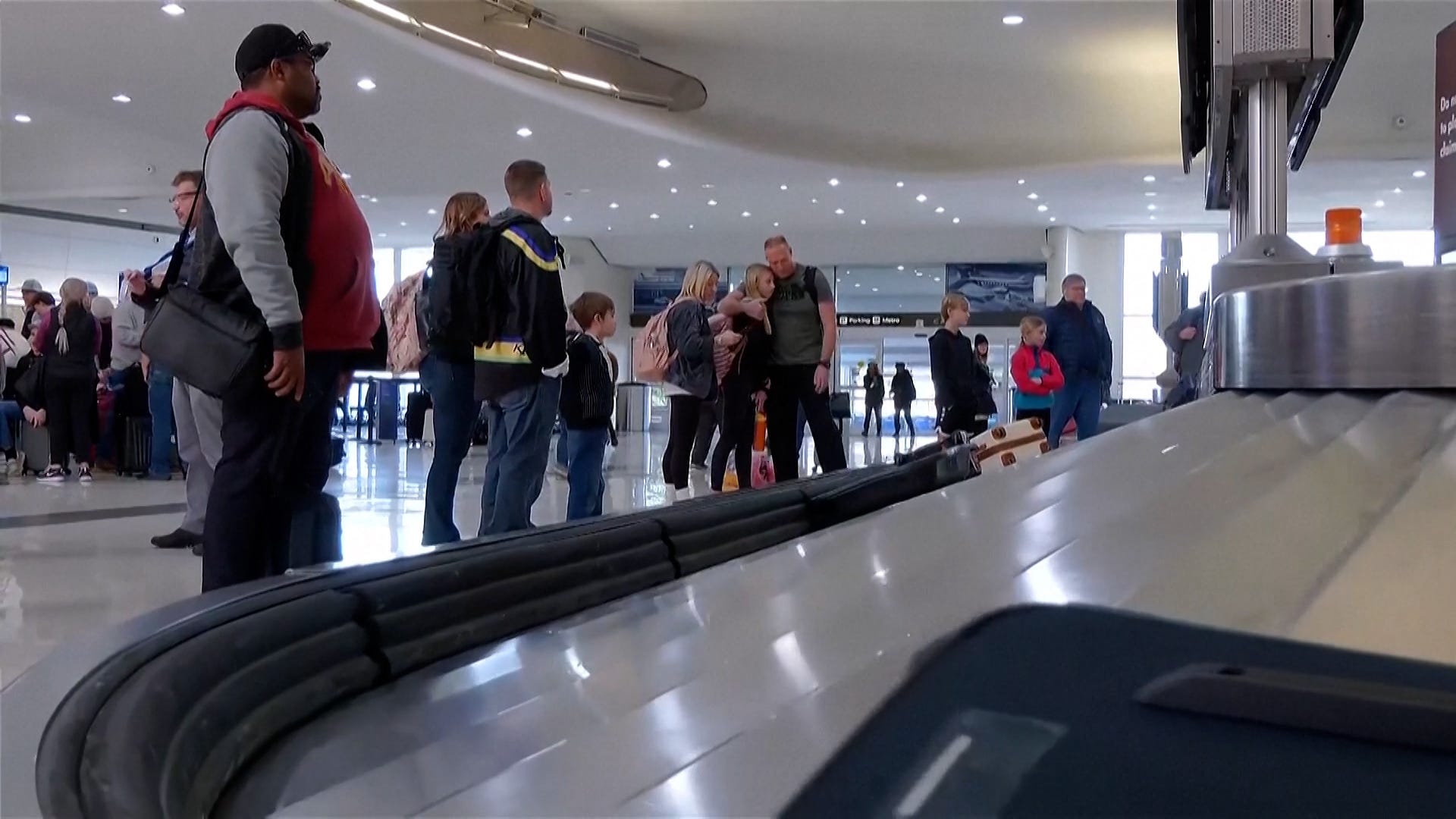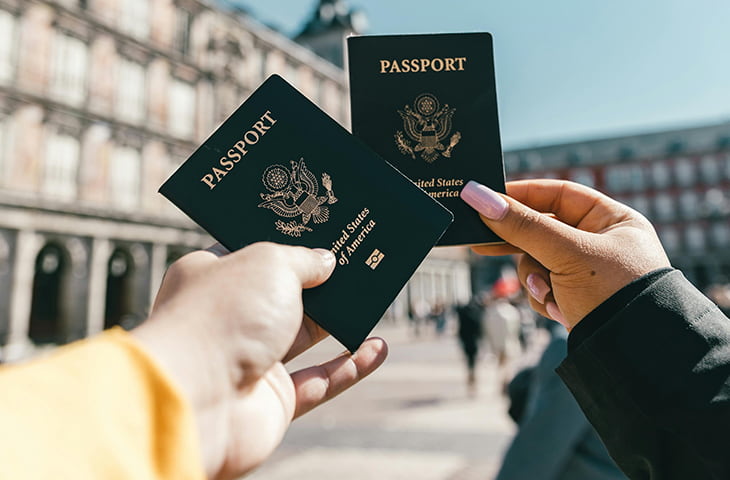Travelers Grapple With Fears After Plane Crash: 'i Don't Know If I Trust Being In The Air'

- A recent mid-air collision near Ronald Reagan Washington National Airport has heightened flight anxiety for some travelers.
- Experts suggest coping mechanisms for flight anxiety such as staying hydrated, limiting caffeine, and practicing grounding techniques.
- Flying remains statistically the safest mode of travel despite recent incidents.
Nadirah Reynolds was planning to fly to Las Vegas for her brother’s birthday next month. But after a deadly mid-air collision between an American Airlines plane and an Army Black Hawk helicopter near Virginia’s Ronald Reagan Washington National Airport on Wednesday, she’s not so sure.
“This just makes me wary, especially for such a long flight,” said the 27-year-old, who lives in New York City. “I don't know if I trust being in the air for that long and going that sort of distance.”
Reynolds, who works in social services, used to fly four or five times a year for vacation and when she was in college. But, after having a daughter and seeing news coverage of recent incidents like an Alaska Airlines door plug blowout last year, she’s grown more fearful.
Reynolds is one of a number of travelers whose anxiety has spiked in the days since the crash. “It's just becoming too frequent to hear about these mishaps with planes, and it makes me feel like I don't know if flying is the safest way to travel anymore,” she said.
Leon Barillaro flew to the East Coast from California before their grandfather died earlier this month, with a return trip planned for Sunday.
“I would say that I am generally pretty comfortable with flying,” the 30-year-old said. “However, the crash itself, I think, freaked me out a little bit.” That’s largely because they are connecting through Dulles International Airport, not far from where the crash happened. After seeing the news, Barillaro began doing research on other near-misses and the state of air traffic control, which compounded that fear.
“I considered, like, maybe I'll get an Amtrak and ride cross-country, but I just don't think I can afford to delay my return any longer because it's been two weeks already,” the game designer said.
Barillaro faced similar anxieties as a child but combatted them with statistics about the safety of air travel relative to other transportation. “My dad traveled a lot for work, so I kind of used my brain and, you know, thought myself out of the fear,” they said. Now, it’s coming back.
“Faced with all of those bodies in the Potomac, it is kind of hard to even look at the statistics right now,” Barillaro said. They plan to make the trip this weekend but will take a “watch and see” approach to other trips down the line.
“The safety of United States airways is not a concern I was expecting to have this year, but it seems like it is something that I'm going to have to pay more attention to before I make any decisions about, you know, conventions that I maybe want to work or network at or vacations I want to take,” Barillaro added.
Reynolds’ concerns have also changed her outlook. She used to take naps on planes, for instance, but on a weekend trip to Texas in September, she kept her eyes open.
“I stayed awake the entire trip, you know, just to be on guard because, at this point, I feel like you never know what can happen on a plane,” she said.
Josette Sullins, CEO of dehp Integrative Care, said multiple factors can contribute to anxiety around flying, including news of crashes or other incidents.
Passengers also have to give up a certain amount of control. “You don't really get to be a backseat driver on the airplane,” she said.
More than 25 million U.S. adults experience a fear of flying, according to the Cleveland Clinic.
Sullins said distress can trigger a fight, flight or freeze response in the body, which is designed to help keep us safe. But news of events like this week’s crash can keep the sympathetic part of our autonomic nervous system activated.
“And so any extra stress or burnout can just really take us over the edge,” she said. Travelers can combat that, though.
Some simple steps can help, like drinking water to stay hydrated, getting enough sleep, and avoiding caffeine and excess sugar. She also recommended trying to ground yourself in your immediate surroundings. One exercise involves consciously shifting your attention to what you can see, hear, and feel nearby.
“Being able to connect to the now and present really balances out both the parasympathetic and sympathetic nervous system,” she said.
Travelers can practice doing that in advance to have the tool ready in case their anxiety spikes. Sullins also suggested researching when planes or airports are likely less crowded – since congestion can be stressful – and bringing noise-canceling headphones and listening to music.
“Make it become a treat,” she advised. “Look for things that you do like about it.”
Travelers can also seek recommendations from their doctor or a behavioral health therapist. Those who find themselves in need of immediate assistance can always call the 988 Suicide & Crisis Lifeline, as well.
“I think the biggest (thing) is just for people to reach out and, you know, do their homework,” Sullins said.
Largely, yes. The Bureau of Transportation Statistics’ 2024 Transportation Statistics Annual Report – issued before the crash – identified flying as the safest mode of travel.
“Transportation incidents for all modes claimed 44,546 lives in 2022, of which all but 2,032 involved highway motor vehicles. Preliminary estimates for 2023 suggest a further decline in fatalities,” the report said. No deaths occurred in 2023 due to crashes on large commercial airlines, though there were several hundred fatalities due to “general aviation, commuter air, and air taxi services” crashes.
Before Wednesday’s collision, there had not been a major fatal airline crash in the U.S. since 2009. William J. McGee, senior fellow for aviation and travel at the American Economic Liberties Project, also offered some reassurance this week.
“We all know, it’s worth saying, and someone like me who’s been critical, it’s worth me saying once in a while: this is an extremely safe system, but that doesn’t mean we don’t constantly have to have our guard up and be vigilant,” he told USA TODAY on Thursday.
Still, Reynolds is leaning toward taking a road trip to Vegas instead. “With the amount of news regarding airplanes and incidents, even before the (fatalities) on Wednesday, it just feels like flights feel less safe than they were advertised,” she said.
Nathan Diller is a consumer travel reporter for USA TODAY based in Nashville. You can reach him at ndiller@usatoday.com.


